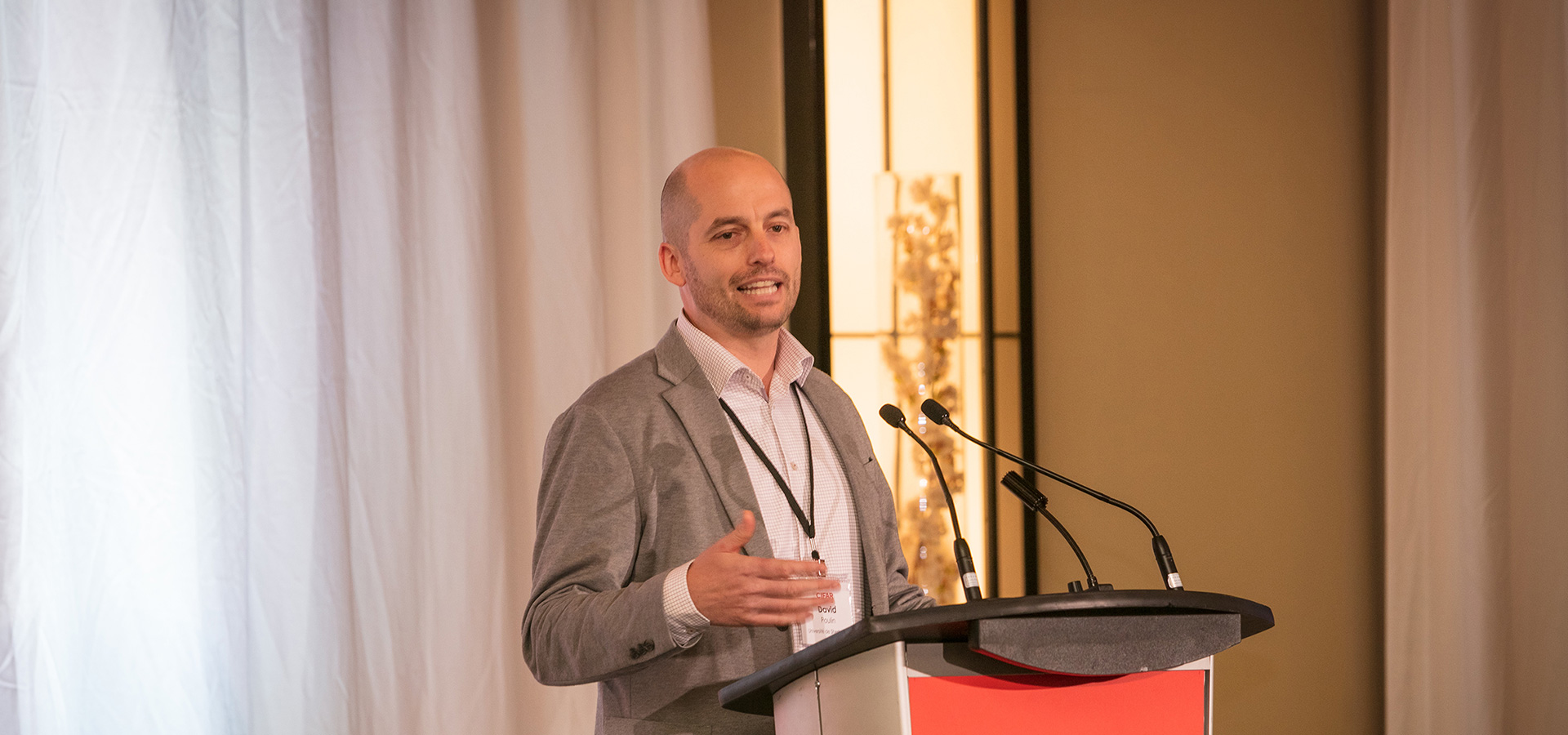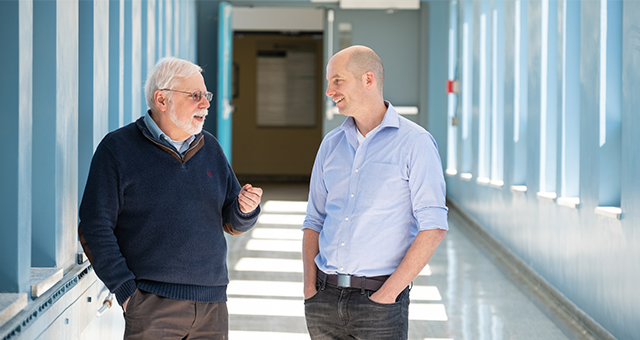By: Jon Farrow
17 Jun, 2020

The CIFAR community was deeply saddened to learn that David Poulin passed away on June 25, 2020.
In a message to colleagues, Quantum Information Science program co-director Aephraim Steinberg wrote “David leaves a huge hole in the worldwide quantum information community, and our own little CIFAR community in particular. He will be deeply missed.”
We extend our deepest condolences to his family, colleagues, and many friends.
David Poulin, the co-director of CIFAR’s Quantum Information Science program and professor of physics at the Université de Sherbrooke, is stepping back from the program to focus on his health. His colleagues and friends gathered virtually on June 5, 2020, to honour Poulin with a Festschrift, a celebration of his significant contributions to the field of quantum computing. The celebration included an edited volume of scientific papers co-written with or inspired by Poulin, memories of his collaborations and contributions, and personal anecdotes.
In May 2004, at a Vancouver meeting of a new CIFAR program in quantum information processing, a graduate student named David Poulin gave a talk exploring the different classical and quantum mechanical effects in a typical experimental set-up. He knew there were Nobel Prize winners in the room, but he likely didn’t expect to have a debate with one of them. When Anthony Leggett, then-chair of the program’s Advisory Committee and fresh from receiving the Nobel Prize in Physics in December 2003, disagreed with certain parts of the presentation, Poulin stood his ground.
“It was a really good argument,” remembers Raymond Laflamme, the director of that nascent program and Poulin’s PhD supervisor at the University of Waterloo’s new Institute for Quantum Computing (IQC). “I could see that David had really thought through his work.”
Laflamme was as full of pride that day in Vancouver as he is today, having witnessed Poulin’s unique charisma, fortitude, and intelligence propel him to the highest echelons of physics.
“He’s a true scientist,” says Laflamme. “In science, you shouldn’t believe someone until you understand them. And that [worldview] very much represents David. It doesn’t matter who you are, you can throw something at him, and if he doesn’t understand it, he will argue and make you prove it.”
“Already as an undergraduate, he was quite remarkable,” recalls André-Marie Tremblay, a long-time fellow in CIFAR’s Quantum Materials program (1987-2019) and professor of physics at the Université de Sherbrooke, who took Poulin on as an undergraduate research assistant in 1999. “He was tackling problems that my post-docs were struggling with, and by the time he finished his degree, he already had two publications,” says Tremblay.

Decades later, the pair remain close, although their academic trajectories have diverged. While Poulin pursued quantum information science, Tremblay continued his research on quantum materials. Over the last year, they have reconvened to collaborate on three papers bridging the gap between their areas of interest. “He was always open to discuss new ideas about new fields,” says Tremblay. “We now have five papers together, spaced by 20 years.”
Alexandre Blais, the scientific director of Sherbrooke’s Institut Quantique, a close colleague, and friend, met Poulin as an undergraduate in Sherbrooke. With a common interest in the then-niche field of quantum information science, they stayed close throughout their careers and Blais is consistently amazed at Poulin’s ability to quickly master topics.
“David is one of the very few scientists that can ask a question at any talk. At CIFAR program meetings, there are talks about a wide variety of topics, and he always asks a relevant one,” says Blais.
Poulin’s ability to rapidly grasp new concepts, combined with a wide-ranging curiosity that spans theory and experiment in computer science and physics, has allowed him to contribute many significant ideas, most famously approaches to quantum error correction, decoding, and state tomography.
His contributions have not been limited to recovering information from quantum systems, however. His
, for example, tackled the theoretical problem of how classical phenomena arise from quantum mechanical processes and later work applied error correction techniques developed for quantum systems to compress information in classical ones. He even contributed to understanding how machine learning and quantum materials could be used to advance quantum information science.
Poulin’s theories were often ahead of their time. Blais recalls bringing a particular set of thorny theoretical issues with superconducting qubits to a conference, sharing his frustration with a colleague, who responded, “You don’t know? Your colleague David Poulin has already solved all of that.”
“Years before, he had solved the problems that were now exactly what we needed to push the hardware to the next level,” says Blais. “His theories were already there, ready for us.”
Among David’s many talents is his ability to effectively communicate his research to different audiences. “David is really good at explaining simply the complicated things that we’re doing,” says Blais.
Whether at large gatherings like CIFAR’s Global Call Celebration, or smaller meetings with donors, researchers from other fields, or lab meetings, Poulin skillfully infuses his clear scientific messages with passion and gravitas.
David Poulin speaks at CIFAR’s 2019 Global Call Celebration
“David is brilliant at making quantum information sound easy to non-scientific audiences. In addition to being a brilliant scientist, his science communication skills are second-to-none,” says Alan Bernstein, CIFAR President & CEO. “His energy and clarity bring the topic to life and he has an incredible ability to inspire others to work collaboratively and to come up with great ideas.”
David acted as a bridge between physics, computer science, theory, and experiment at CIFAR program meetings. “The challenge that we’ve been saying from the beginning of the CIFAR program is that we need to bring physicists and computer scientists together, because we don’t speak the same language,” explains Blais. “By bringing us together repeatedly, we will learn a common language and discoveries will come out of that. I think that David is the only one who could, from the get go, speak the two languages.”
After post-doctoral studies in Australia with Gerard Milburn and at the California Institute of Technology with John Preskill, Poulin’s decision in 2008 to accept a faculty position at the Université de Sherbrooke was instrumental to the growth of the quantum community in Sherbrooke.
“After I joined in 2006, David was the next quantum information hire at Sherbrooke,” says Blais, and Poulin’s impact was immediate. “Suddenly, I had a colleague. We could have journal clubs! There was life in quantum information outside my few students at the time.”
His impact is felt not just in Sherbrooke, but globally, and his research garners many accolades, hundreds of citations, and the enduring respect of researchers around the world. His colleagues also often comment on his personal charisma and charm. “He has a really charismatic personality,” says Tremblay. “When he’s in a room, people gather around.”
In October 2019, he accepted a position at Microsoft as a Principal Researcher. “David brings energy and new ways of seeing to our team,” says Krysta Svore, the general manager of the Quantum Architectures and Computation group at Microsoft. “While he’s only been officially on the team for just a short time, we’ve considered him part of our family for much longer.”
“When I think about David, I think about someone who loves challenges, whether they were intellectual, or physical,” says Laflamme. He recalls many fascinating conversations about science, as well as outdoor adventures with Poulin, including swimming in the frigid waters of Baffin Island, night skiing in Los Alamos, and mountain bike rides in the forests near Waterloo.
Poulin attended many CIFAR meetings as a graduate student in the early 2000s and was deeply involved in the quantum information science community. He formally became a CIFAR fellow in 2014 and in 2018 he became co-director of the Quantum Information Science program. He took over for Laflamme, who had led the program from its inception in 2002.
Poulin, with co-director and University of Toronto professor Aephraim Steinberg, led the program at a crucial moment in its history. Faced with a competitive renewal process, they took the program in a new direction, emphasizing the information science perspective and inviting more international fellows and experts with ties to industrial labs.
“The program needed to be transformed,” says Laflamme. “When you’ve done something for fifteen years, you need new blood, you need new energy. David was definitely the right person to lead the new program.”
“David was more immediately open to thinking about large structural changes and not being bound to the way things had been done before,” says Steinberg, Poulin’s co-director of the CIFAR program. “Working with him on rethinking the program brought me a lot, and I think will continue bringing me a lot in my approaches to all sorts of organizational challenges.”
“David is amazing, especially in terms of his creativity and his readiness to rethink everything. I think that creativity has been a hallmark of David administratively, but also in his research. I hate to use the cliche, but he is always looking outside the box and around the corner for the next great thing.”